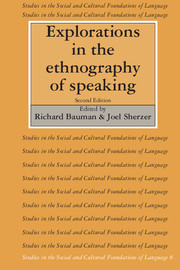Book contents
- Frontmatter
- Contents
- INTRODUCTION TO THE SECOND EDITION
- I PREFACE AND INTRODUCTION
- II COMMUNITIES AND RESOURCES FOR PERFORMANCE
- III COMMUNITY GROUND RULES FOR PERFORMANCE
- Introduction
- 4 Warm Springs ‘Indian Time’: How the Regulation of Participation Affects the Progress of Events
- 5 Contrapuntal Conversations in an Antiguan Village
- 6 Norm-Makers, Norm-Breakers: Uses of Speech by Men and Women in a Malagasy Community
- 7 Speaking in the Light: The Role of the Quaker Minister
- IV SPEECH ACTS, EVENTS, AND SITUATIONS
- V THE SHAPING OF ARTISTIC STRUCTURES IN PERFORMANCE
- VI TOWARD AN ETHNOLOGY OF SPEAKING
- Notes
- References
- Index of names
7 - Speaking in the Light: The Role of the Quaker Minister
Published online by Cambridge University Press: 05 June 2012
- Frontmatter
- Contents
- INTRODUCTION TO THE SECOND EDITION
- I PREFACE AND INTRODUCTION
- II COMMUNITIES AND RESOURCES FOR PERFORMANCE
- III COMMUNITY GROUND RULES FOR PERFORMANCE
- Introduction
- 4 Warm Springs ‘Indian Time’: How the Regulation of Participation Affects the Progress of Events
- 5 Contrapuntal Conversations in an Antiguan Village
- 6 Norm-Makers, Norm-Breakers: Uses of Speech by Men and Women in a Malagasy Community
- 7 Speaking in the Light: The Role of the Quaker Minister
- IV SPEECH ACTS, EVENTS, AND SITUATIONS
- V THE SHAPING OF ARTISTIC STRUCTURES IN PERFORMANCE
- VI TOWARD AN ETHNOLOGY OF SPEAKING
- Notes
- References
- Index of names
Summary
Like many sectarian religious groups, and in keeping with the fundamentally rhetorical nature of religion (Burke 1961), the Society of Friends (Quakers) was from its very beginning in the mid-seventeenth century highly concerned with and self-conscious about the social and spiritual use of language. In earlier papers, I have discussed some of the guiding principles and characteristics of Quaker sociolinguistic usage in the seventeenth century, including the Quaker notion of Truth, Quaker folkrhetorical theory, and the rhetorical implications of Quaker plain speech and silence (Bauman 1970, 1972, 1974). The purpose of the present paper is to develop further on the sociolinguistic history of the seventeenth century Quakers by discussing some of its basic themes from the perspective of a particular communicative role, the minister. In a Society which was itself set apart from its wider social environment by distinctive ways of speaking, the minister was further differentiated from his fellow Quakers as the bearer of the only role within the Society of Friends defined in terms of speaking. The role of the minister was the point at which two of the major and opposing themes in Quaker sociolinguistic usage came together, a structural center of the domain of speaking within the Society of Friends.
In addition to contributing to the sociolinguistic history of Quakerism (cf. Samarin 1971), this study is intended as a partial demonstration that the ethnographic perspective on the study of language use need not be restricted to fieldwork in contemporary settings, but may be effectively extended to historical cases as well.
- Type
- Chapter
- Information
- Explorations in the Ethnography of Speaking , pp. 144 - 160Publisher: Cambridge University PressPrint publication year: 1989
- 21
- Cited by



